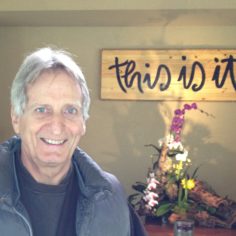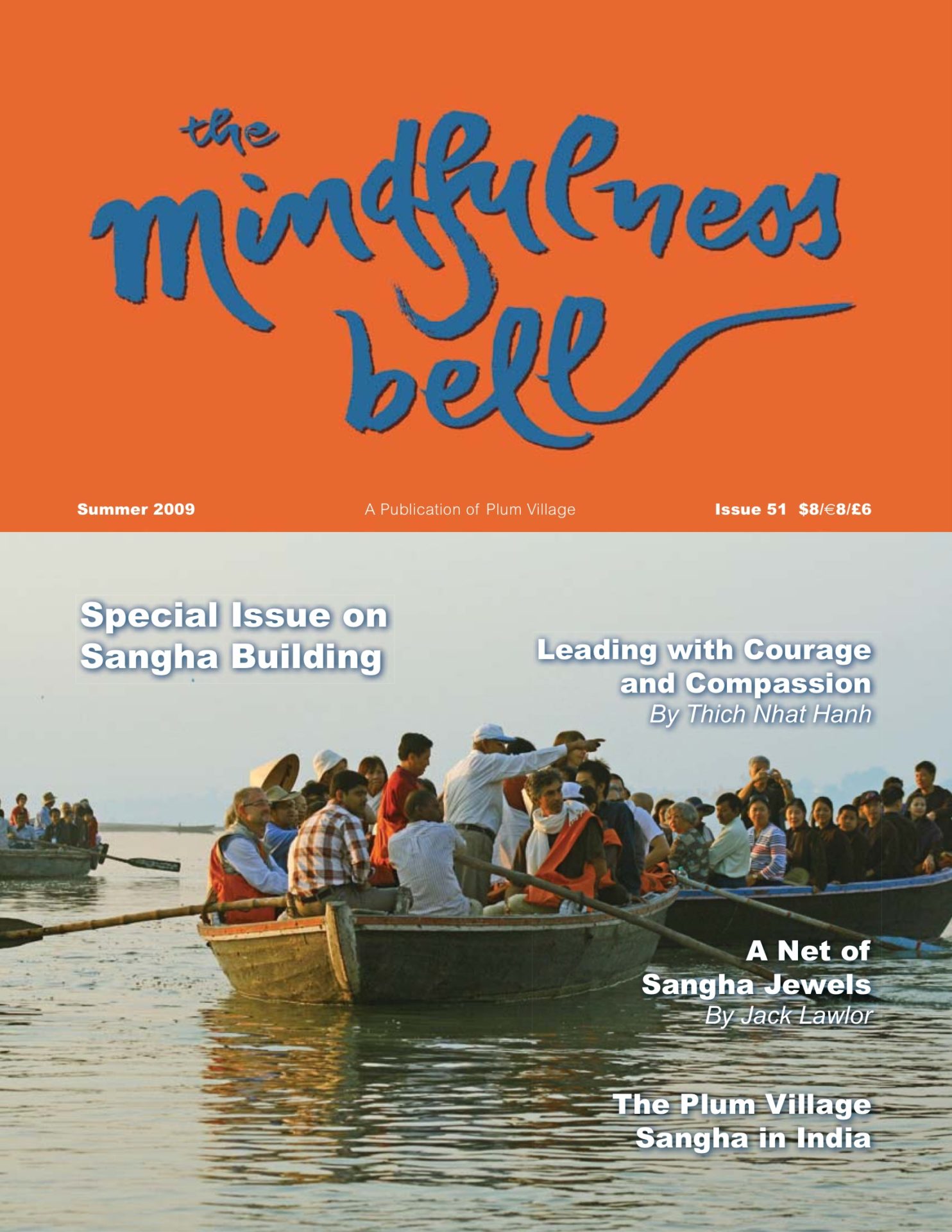By John Bell in June 2009
At the January 2007 Order of Interbeing retreat at Deer Park I found myself in a handful of conversations with monastics and lay members about mentoring and support of OI members. It seems that aspirants for the Order get mentoring in preparation for ordination—the aspirant does assigned readings, a Dharma teacher checks in on the aspirant’s practice, and the Sangha sometimes holds a Shining the Light for the aspirant.
By John Bell in June 2009
At the January 2007 Order of Interbeing retreat at Deer Park I found myself in a handful of conversations with monastics and lay members about mentoring and support of OI members. It seems that aspirants for the Order get mentoring in preparation for ordination—the aspirant does assigned readings, a Dharma teacher checks in on the aspirant’s practice, and the Sangha sometimes holds a Shining the Light for the aspirant.
But typically once you are ordained, you’re on your own! It seems that only rarely does an OI member have ongoing mentoring by a Dharma teacher or monastic. Even lay Dharma teachers have little personalized support. It seems that this lack of structured support leads some lay OI members to feel disconnected, isolated, and lost, or to leave the Order altogether.
I’m wondering if there might be a missing piece in our community’s structure. I pose it as a question: What would it look like if someone were committed to your full awakening? What would it be like if someone more experienced and wiser in the practice personally cared about your liberation? How might that accelerate your development along the path?
A Personal Spiritual Relationship
As I understand it, at Plum Village, Blue Cliff, and Deer Park Monasteries, there is a mentoring relationship among monastics; each has a specific big brother or big sister. Other traditions have built this relational piece into their practices. If you are in a Twelve-Step program, you have a “sponsor” whom you call or who calls you on a regular basis. If you are in psychotherapy, you have the therapist who not only listens deeply, but also asks important questions that you might not ask yourself. In a peer counseling community, at least one other person is committed to your “re-emergence” and actively assists you to identify and shed unwholesome habit energies.
Another way to get at this issue is to reverse the question: What would it look like if I were committed to someone else’s full awakening? When asked this way, some elements of a caring, personal spiritual relationship become clear for me.
- First I would have to be committed to my own full awakening! Do I really intend to be free or am I just going through the motions? Am I willing to recognize and embrace my own suffering in order to realize true peace, or am I wanting to stay comfortable and comforted? How do the five hindrances operate in my own practice—desire, aversion, dullness and drowsiness, agitation and regret, and doubt? If I knew that I could only truly assist another to the extent that I had freed myself, then such questions would motivate a more sincere effort, sharpen my practice, and increase my ability to be present to the person I’m committed to.
- I would want to practice the four levels of love toward the person—loving kindness, compassion, joy, and I would want to be active in knowing the person and their struggles, showing love, and giving him or her my best.
- I would want to check any ego tendencies to “help” or “save” the person, to create dependency, or to pat myself on the back for feeling wise, more advanced, or in some way better than the person I’m committed to.
- I would want to continually study and practice the Fourteen Mindfulness Trainings as the grounding for my behavior. If I were not walking the talk, it would show up (at least to myself) in the relationship with the person I’m committed to.
- I would have to learn how to accept the expression of deep emotions, since the person’s suffering would arise in the course of their liberation I would want to be present when it happened, even urge emotions up and out, if appropriate. I know from my own experience that full release can cleanse and permanently relieve long-stored suffering. The more I have done my own emotional work, the more capacity I have to accept the emotions of others.
- I would want to continually add to my toolkit of skillful means so that I could think about the person from many perspectives. To twist an old saying, I want to avoid having only a hammer so I don’t treat everything as a nail. A person’s journey to inner freedom is sometimes subtle, nuanced, non-linear; sometimes wild, roaring, ecstatic; sometimes depressing, confusing, scary. A hammer won’t do for all these!
- I would want to ask for help when ) didn't know what to do. This is where the person committed to my full awakening could come in handy! Or a trusted advisor, or the Sangha, or a Dharma teacher, or a text.
The Benefits of True Love
There are risks in setting up such committed relationships. Since we are human beings and can get hooked by all sorts of unwholesome behaviors, we can fairly well predict that sticky situations would arise. For example, the mentee feels judged or shamed; the mentor feels unskilled or unsuccessful as a mentor; unhealthy dependencies develop; the two cross some boundaries and cause further suffering. However, I suspect that beneficial relationships would far outnumber the distorted ones. The benefits are two-way: if I commit myself to your full awakening, then that intention will necessarily encourage me to grow. True Love is never one-way.
There are a couple of methods that we could experiment with:
- Formal mentors. Upon ordination each OI member is helped to find an older Dharma brother or sister who would serve as a mentor. This might be the same person who mentored the person as an aspirant. It might be someone with whom the Order member has built a good relationship. It could be a monastic or lay Order member. The mentor would find ways to get to know the person, set up regular practice check-in by phone or in person, and try to attend at least one annual retreat with the person.
- Practice Partners. Where an older brother or sister is not readily available, two Order members might pair up and agree to check in regularly. They might ask each other about learnings and challenges in their practice. They could offer reflections, feedback, and suggestions. They might attend retreats together. They might occasionally check in with a Dharma teacher if they feel stuck in their relationship. This kind of peer mentoring would encourage mutual deep listening.
Still other arrangements would occur to us if we began thinking about mentoring. We might need a monastic or senior lay Dharma teacher in charge of thinking about and tracking these support relationships. Maybe when registering for retreats, in addition to stating our Dharma name we would also list our mentor.
A Cascade of Mentors
Creating such mentors or practice partners would call for a crucial shift: each individual, beginning with each lay Order member, would be thought about in a personal and ongoing way. The most important piece is for the Order member to feel personally known and cared about by their support person, and to feel that their practice is deepening partly because of the support person’s commitment to their spiritual development. While it is true that we are all connected and safe in the ultimate dimension, it is most helpful to feel the connection and love on the personal level. I’m envisioning a kind of cascading mentorship, from Thay to senior monastics, senior monastics to senior lay Dharma teachers, senior lay Dharma teachers to senior lay Order members, senior lay Order members to newer Order members, newer Order members to aspirants and Sangha members.
The two guiding relevant questions for Order members are:
- Who is personally committed to my full awakening?
- Whose full awakening am I personally committed to?
Would this approach be worth trying? What might the benefits be? How might we begin?


